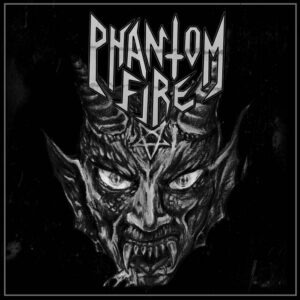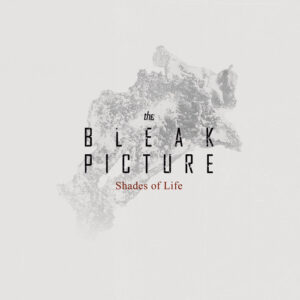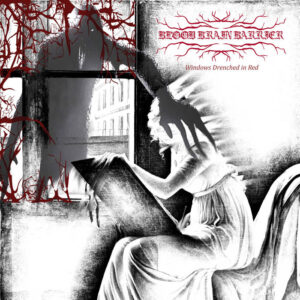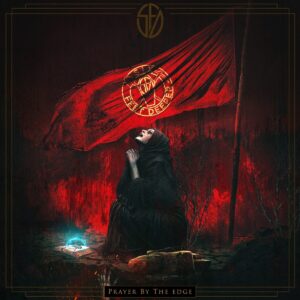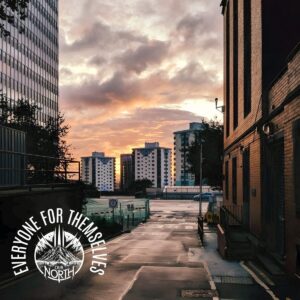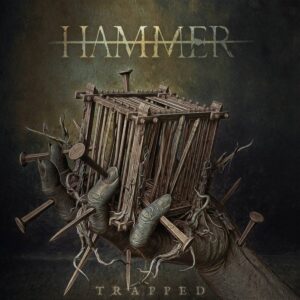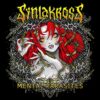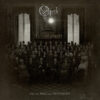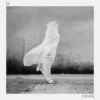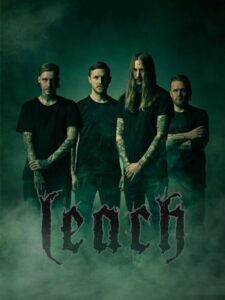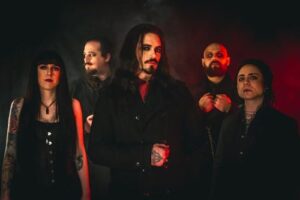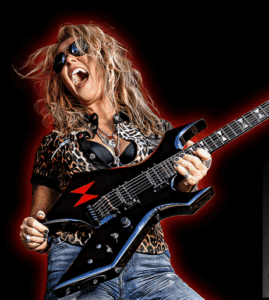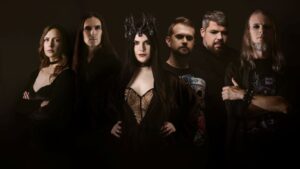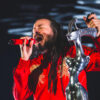Korinna König
CANTERRA
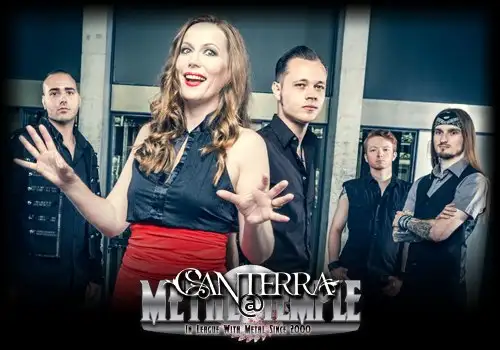

That was a long time ago. Well, I always wanted to sing, but I never had the chance to try to do it seriously. I was the kind of typical girl who sang a lot and bothered everyone by singing all day, but I finally got to the point where I was self-confident enough to try to join a band. I wanted to try to write songs in addition to being a singer. At the time there were many platforms on the Internet where you could post ads for bands and musicians, and I found one by Harry. He listed some of the bands that he liked, and they were a lot of bands I liked as well with a kind of dark Gothic sound. I saw the ad and thought, "Okay, that sounds interesting."
He was living in a town near Leipzig where I live, so it was easy to meet. We tried to write songs together. We immediately wrote one song that we still are actually performing today — "Escape." This was the first song we wrote together. It was kind of the magic feeling and we both thought that it worked. Sometimes I have the feeling, even when I look at other bands, that there are combinations of people where you can tell they are able to write songs together even though they are completely different characters. That's the case with Harry and me.
Yeah, definitely, it's the heart and soul and the nucleus.
Yes, there is, but before I give you the answer, I'll take one step back. After OLEUM we needed a new name and we just decided on AVATAR. We didn't take it as seriously as we should have, it was just a fast decision. Then the following year we looked around knew we needed a new name. That was clear. I can't remember the other possibilities, but we collected names and decided democratically. It was not 100 percent unanimous at first. We had a lot of discussions, but in the end the meaning and the feeling that you get when you hear the name was the deciding factor.
CANTERRA is actually a combination of two words. One is "cantare," which is an Italian and Latin word meaning to sing. "Terra" is the word that stands for the soil and the ground. For me, it felt like the perfect combination between the ground — which are the guitars and the strong beat, the strong metal sound — combined with the voice. It just felt right in the end. And it also has a similarity to my name, which is kind of funny, Korinna and Canterra. The third interesting thing is that I have always felt that if someone didn't know the name of your band and then read it, they should immediately have in their imagination an idea of what the music would sound like just based on the sound of the name. The music that we wanted to create with CANTERRA felt like it really fit with the name. Even the "a" ending, which is feminine in many languages, suggests there might be a strong female voice inside. The name itself sounds a little bit like a melody.
These were very different processes. One very funny one is our bass player, Tom, who has been with us for many years. He is a big part of the band. He's a very important, psychologically important, player. He's very motivated. For example, he played in another band from our town and he saw us playing a small concert. How do you call it in English? It was kind of a place where people care about animals, exotic animals that people buy, and then they can't deal with them and just release them. There's snakes and iguanas and all sorts of exotic animals. We were playing a benefit show for them and Tom was in the audience. Immediately, he said "this is my band, this is the band I need to be part of." It was kind of magic. We all just fit quite perfectly together.
Then there is Max, our drummer. You know, drummers seem to be very complicated. There are so many drummer jokes around here. A lot of bands go through drummers, I don't know why. We are very happy to have Max. We've played a long time with him. He's like a family member.
And finally, there's Hannes, our second guitar player. Hannes is a strong guitar player and also a songwriter, but not everyone knows that he's a mastermind when it comes to production. We send him our files and he builds the demos from there.
It was our first experience with recording. And if you are a small band just starting out, you are happy with everything you get. And that was the case. In Leipzig we have good studio capabilities available. It's a very rich cultural city with a lot of opportunities. We looked around for someone to record it that we could afford. In the end we made a very, very fast recording, because that's what we could afford. And yeah, there was no plan at all. These were the best songs we thought we had at the time, then we just recorded them. That's the reason why you can't find it digitally, because the album has no label. It's just under the radar. We sold physical copies at our concerts, and now there only a few copies left. We're thinking about maybe rerecording it or remastering it, because nearly all copies are nearly sold out. It was a long time ago. But yeah, maybe we should rerecord it.
We really wanted to do a full-length album, but in the process we learned that it takes time. It took us some time, but we found an indie label that we could work with. It was a big, big step because we took it seriously. This was very important for us. We tried to do it as good as we could. As far as the theme, there is no red line through the context of the songs. It was just our collection of the songs we wrote in these years. So not so romantic information about that. Actually, it's a kind of phenomenon that I think many songwriters have. When you write the lyrics or songs, you just write what you think. Or maybe you just need a good melody and you don't think too much about it, but afterwards, when you read the lyrics through again with a little bit of time in between, you realize there's a connection between the themes you wrote about. This is what happened with "First Escape." We thought about each song, how they connected, and then came up with the title of the album that really seemed to fit.
If you look at the songs on that album, you'll see there are a lot of songs that deal with finding some freedom, you know. Also, it was our first step towards being serious musicians. So it was kind of our first escape from our normal lives to a world of music. And yeah, it felt really good. There was also a movie out at the time — I think it was "The Maze Runner." The poster showed someone escaping from a labyrinth. When we saw the poster of this film, we related it to the whole escape theme and that led to the ideas behind the album artwork. Then it was born.
Yeah, this is a very interesting question because, in fact, we didn't want to use too much symphonic. We always wanted to do just a little bit, maybe here and there. Then there was the fact that we didn't know how to do it! At first we just tried it for fun. Then we saw that it added something to the music which we liked. From there we just got addicted to it a bit, but we always try not to overdo it. In the end, when we play all the songs from the "First Escape" album, there is always a lot more power in the songs with a little bit of symphonic behind. That's how we fell in love with the symphonic element. I love classical music as well, but I wanted to avoid being too classical with a symphonic element. Right now, we just try to do more experimental, kind of an accent and not too much orchestra. I love big film music and orchestras and then there is NIGHTWISH, who already do it perfect. It might be interesting to see what the future brings, but right now we love the balance we have with the symphonic elements.
No plans right now, but it can happen anytime. We usually don't plan things, it just happens. That's kind of a luxury situation, because we don't have to do it. For instance, nobody tells us when to do an album; we just do it when we want to. And this is kind of comfortable. Personally, when I write German lyrics, it's always for different kinds of music. I don't know why, but it's not CANTERRA songs. So maybe you won't be surprised to find that the lyrics for "Der Einzige Erbe" were written by Harry. This song is really special. It's difficult to play it live, because of the emotions. Yeah, we did it two or three times, but it's so emotional the first row would be crying when we played it, and it's hard to build up the power after that!
In fact, it was an accident and an interesting one. We were playing a metal ship concert in Germany on the river and we had a long set. We thought, maybe we should just try something and not take ourselves too seriously. So, we played this old song in the rehearsal room and we said, "Okay, now play it faster." You know, just for fun. When we did, then the melody changed and it was like, wow, this is so much cooler.
I fell in love with the song again. I said, "Okay, now that's the kind of version we can go with." And we just played it there. It was like the ship had an explosion in the audience. It was like, wow, it's a simple song but it has a lot of power. Yeah, so it worked, and we said, "Okay, let's put it on the album and maybe it gives the album another element in the heavier direction." So we did it. There is a binding to the old times and a binding to more Gothic metal. Yeah, so a funny story. So maybe we do have an interesting thing with last songs.
Similar to "First Escape" we wrote a lot more songs than ended up on the album. We decided, okay, this is good let's take these songs. And there was this song "Heartmachine" in that collection. When you think about the things we want to talk about on this album, "Heartmachine" kind of sums it up. It's a red line that goes right through the songs. Let me explain, for us the heartmachine is a symbol for life, for truth, and for the energy you have if you want to reach something or you want to do something. If you want to do something, you cannot sit on a sofa and wait for it to happen or complain about the things you don't like. You have to do something. It might be politics or climate change, but you have to do something. It's not going to happen by itself.
At the time our bass player Tom, who is working in the hospital, came up with the idea of kind of heart machine, maybe inspired by his work . At first it did not make sense, because "heartmachine" isn't an actual word, but, in the end, it was the right word creation. It combines "heart," you know passion and things you believe in, and "machine," like a powerful driver than gets things done. And we said, "Yeah, that's it."
That's another interesting story. To say he's talented doesn't do it justice. He's an extraordinary German artist. His name is Holger Much. He does artwork for many bands and books. We reached out to him and shared two concepts we had, and he brought the two concepts together. What was insane was that after we talked about it, he was so drawn into the idea of this artwork that he painted it overnight. We went to a soccer game the day after we talked to him. During the break I checked my emails, and I had a message that the artwork was ready. In one night! Can you imagine that? We are very thankful for his work. It's very detailed. You know, if you zoom in and look at the fire, it's just amazing. He really excels at deeply detailed paintings.
You always want to reach a wider audience, of course. But these songs are like children to us, and they have to live. They live by playing them in concert or on the air. When we write our songs, what we always need is a very strong melody for it to make it on the record. Right now we don't feel the need to make 15-minute songs. There are awesome ones out there, but right now a 15-minute opus is not for us. So we stick with what we have a passion for.
Yeah, definitely, the idea of revolution is one of the main messages of "Heartmachine." I don't know how it is in the US, but there is a generation in Germany or Europe who has everything, and most important things are entertainment and having a cool lifestyle. You know, nothing that gives one's own life a meaning happens or is in the focus. It's just to consume, everything is safe, nothing can happen. The most important thing is to build a house and go on holiday. And while all these things are good and I wish everybody could have them, I think something gets lost along the way. Many of these people have become complacent and have lost their passion for changes. The good news is that desire for change is now with the young people here in Germany. When I see it, I'm so happy because the people go out on the streets, they say what they think again and this makes me hopeful.
I was born in the GDR [German Democratic Republic, or East Germany]. I was a little girl when the wall came down here. It was kind of a magical feeling. I always get goosebumps when I think about it. And when I think about all these people that made this revolution and then I see the younger generation today, it makes me hopeful again. And "Revolution" is about making that type of change.
On this album I was focusing more on the content of the lyrics than on the previous album, so you have songs like "The Day" which is about climate change on one level but not only climate change that we hear about in the news every day, but as humans beings we are a kind of disease that is poisoning the planet. And I don't want to be a part of it . . . but here we are. So, this is the kind of a discussion the lyrics of this album takes on.
Deep in my heart, it doesn't matter to me at all. I don't necessarily feel like a German band or a local band, it's only a matter of geographical distance. We are obviously from this area, so we perform here most but in the end our music is for an international audience. Our themes and messages are universal. It doesn't matter what country you are from; our music is for everyone.
We are very honored, of course. These are all bands we love. It would be different if we didn't like these bands, but we love their music and it's a huge compliment when people say that.
I think we could talk for hours about this one topic. With CANTERRA I think there's nothing special or unusual about it. Maybe it was different 20 years ago, but in the last many years people haven gotten used to it. It's normal now. Most metal bands, of course, don't have female singers. Yeah, and maybe that has something to do with that the fact that you need a special voice to come over the music or you need a special combination so that a female voice sounds good.
On the other hand, the music business itself is a hard surrounding and you have to deal with many things. It's not so easy. There are the trials of going on tour, of recording, of practicing. You have no weekends; you have no spare time. When you are on tour, you don't have space. You are very limited with all the things you have around and there is no glamour. There is nothing like that. It's the opposite of glamour. You have to deal with it and it's hard. In fact, I would say in many ways the metal world is still the male world, but I always have the feeling that when you come in as a woman, people start to behave different. I still love it.
No, not at all. You know, in Leipzig we have an opera house and an excellent classical concert hall. We have a lot of classical concerts here, and they have programs for children as well. It's easy for parents that want to do it to just push a bit and go there with the children and show them the world of music. And we did that. My parents were always interested in music, and they kind of pushed me a bit in that direction softly. I was always in love with music. It's no big social thing here. Even in GDR times, music was always there. You had music on the streets and classical music. Leipzig is a very classical city. Maybe that has something to do with it.
I can't remember exactly how old I was. I was always singing. If you mean in a formal sense, I started to take lessons after I finished university. When I did I realized the voice is able to do more than I had ever thought or heard before. When you start to take singing lessons and you find the right teacher, a whole new universe opens up. At least it was like that with me.
Oh, that's an interesting question. I really love the classic Gothic metal bands, TIAMAT, the old HIM records and, you know, the first female-fronted Gothic metal records of NIGHTWISH and THEATER OF TRAGEDY. But I really I listen to nearly everything, besides hip hop or so. But I must admit I have a Sean Paul CD, which I love, which is completely opposite to the music that we do. I love strong rhythms and strong beats like SEPULTURA uses very well and that is used in Ragga music. We have bands in Germany that do this. So maybe that would be a surprise.
That's a difficult question. As far as Germany or Europe, I am afraid that many small venues won't survive this time. Many small labels or publishers may fall as well because they need the revenue that comes from live concerts. So, nothing has come for half a year and won't come in for the near future. I'm sure the big bands or the very big labels will survive, but I am afraid that many of the small to mediums might collapse.
For CANTERRA, we are in a lucky position because we all work, but it still has a psychological effect. Besides the chronic problems we all have with the changes in our daily lives, routines, having to be at home more, we were impacted because we wanted to start this big European tour. That was at the time when COVID was at its worse in Germany, so we had to cancel everything. We don't know if it will happen.
We discussed it a lot. It was clear that we didn't know how long the pandemic would last, but we knew that our fans needed the music. The content of the songs, the lyrics, are exactly about things like this. So, we decided not to wait.
Of course, many other bands have the same problem right now. The power that you would have had with a big tour, it's not happening. This really feels bad. We'll try to maybe put out a video for next month, but we don't have any concerts planned. The last thing we want to do is put pressure on people to come out and then have something happen. We don't want to be the band that puts people in danger, so we'll wait. The only thing we have scheduled is a post release concert, but I don't know if it will take place. We'll see how things work out.
No, because if we would do something like that the quality has to be really good. It needs a lot of organization and a lot of space and time. If we do something, we want to do it good. I'm not confident we can do that sort of production. It really takes a lot, and I wouldn't want to risk doing it poorly.
I'm starting to write CANTERRA songs again. Besides that I am personally trying some completely other styles for some fun collaborations with other colleagues these weeks. We will wait to see what happens. We'll try to do videos of the songs on the album, because the songs are so great, they turned out in a way we always were searching for. The production quality is really good. If I could afford it, I would like to do a video of every song.
In these days, more than in normal times, we have to take care about each other and be true to each other. If we have different views on things, this is normal, this is natural. We should not start to build walls. We have to break them down and talk to each other. It's normal to have different opinions, but it should be possible to talk to each other in a normal way. You know, in healthy discussion conflict should be possible. We should be able to stick to the facts. It is possible to have a discussion and not explode. We can take care and have respect. Even if the other person is totally different, we have to be respectful with each other and then we can overcome this, I think.
There is a famous old German philosophical saying which may be hard to translate to English: You should always keep in mind that you don't own the truth. You never know exactly what's going on. There is always a different perspective and different things happening that we can't understand or see. If we have this in mind, then maybe it gets a little bit easier.
More results...
